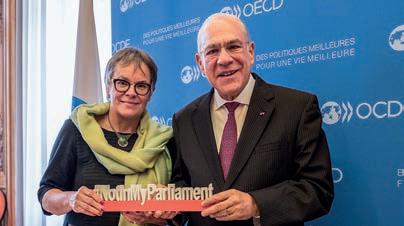
7 minute read
Skills mismatch warning; Fossil fuel support threatens climate action; New development standard to fight abuse; Working past 65; Soundbites; Economy; Country roundup; Other stories; Plus ça change
by OECD
News brief
Skills mismatch warning
More students are obtaining a higher education than ever before. In OECD countries, 44% of 25-34 year-olds in 2018 had done so, compared to 35% in 2008, according to Education at a Glance 2019. The returns to education are clear: as those who have completed higher education are more likely to find a job than those who only have finished high school and they earn more too. But are students graduating with the skills they need to find work today—and tomorrow? Some sectors in high demand can’t find workers with the right skills. Less than 15% of new students in bachelor’s programmes choose to study engineering, manufacturing and construction, while less than 5% study IT, despite these sectors having among the highest employment rates and earnings. Women are particularly under-represented, making up fewer than one in four entrants, on average, across OECD countries.
See www.oecd.org/education
Fossil fuel support threatens climate action
Government support for fossil fuel production and use is on the rise again, after a drop between 2013 and 2016, threatening efforts to curb greenhouse gas emissions and air pollution, and the transition to cleaner and cheaper energy. Support across 76 countries increased by 5% to $340 billion in 2017, according to a new OECD-IEA report.
See www.oecd.org/fossil-fuels
Economy
Real GDP growth in the OECD area slowed to 0.5% in the second quarter of 2019, compared with 0.6% in the previous quarter, according to provisional estimates. It slowed markedly in the UK, to -0.2% from 0.5% in the previous quarter, and in Germany, to -0.1% from 0.4%. It also decelerated more moderately in the US and Japan, to 0.5% and 0.4%, and more marginally in France and Italy, to 0.2% and 0.0%. GDP growth also slowed in the European Union and the euro area, to 0.2% compared with 0.5% and 0.4%, respectively, in the previous quarter. Year-on-year GDP growth for the
New development standard to fight abuse
The OECD’s Development Assistance Committee (DAC)—made up of 29 donor countries and the EU—has agreed on a comprehensive set of recommendations aimed at preventing sexual exploitation, abuse and harassment. National aid agencies will be able to apply the measures when working with civil society, charities, and other bodies running development programs or delivering humanitarian aid.
See www.oecd.org/development
OECD area slowed slightly compared with the previous quarter, to 1.6% from 1.7%. The US recorded the highest annual growth, at 2.3%, while Italy recorded the lowest, at 0.0%.
The OECD’s composite leading indicators continue to anticipate easing growth momentum in the US and the euro area as a whole, particularly in Germany. The CLIs continue to signal stable growth momentum in the OECD area as a whole and in France and Canada. In the UK, for which large margins of error persist due to Brexit uncertainty, the assessment remains for stable growth momentum, albeit around historically low trend
Soundbites
Our house is burning down and we’re blind to it.[…] Let us make sure that the 21st century does not become[…] the century of humanity’s crime against life itself.
Former French president, Jacques Chirac, who died 26 September 2019, addressing the World Summit on Sustainable Development, 2 September 2002. See www.jacqueschirac-asso.fr
This is all wrong. I shouldn’t be up here. I should be back in school on the other side of the ocean, yet you all come to us young people for hope. How dare you?
Greta Thunberg at the UN Climate Summit, 23 September 2019, Washington Post
That “greatness” that I have achieved is something that everybody has the ability to create and be. Really, any one of us has this power.
Xiuhtezcatl Martinez, Indigenous rights and climate activist, artist, 28 August 2019, Landscape News
Working past 65
In the face of rapid population ageing, governments must promote more and better job opportunities for older workers, in order to protect living standards and the sustainability of public finances, according to a new OECD report. Working Better with Age projects that the number of older people (50+) who will need to be supported could reach 58 per 100 workers in 2050, on average in the OECD.
See www.oecd.org/employment
growth rates. In Japan and Italy, the CLIs continue to point to stabilising growth momentum.
OECD area inflation picked up to 2.1% in July 2019, from 2.0% in June, as annual inflation excluding food and energy increased to 2.3%, compared with 2.2% in June. Energy prices were flat, following the -0.2% decrease in June, while food price inflation slowed slightly to 2.1%, compared with 2.2% in June.
The OECD unemployment rate was stable at 5.2% in July 2019. Across the OECD area, 33.3 million people were unemployed. The unemployment rate
Luxembourg’s economy has grown at a robust pace and the country has enviable levels of well-being, but public policy must do more to preserve and share prosperity. www.oecd.org/luxembourg Country roundup
In Japan, narrowing the productivity gap requires enhancing product market competition and SME competitiveness. Barriers to trade and investment inflows should be reduced to deepen Japan’s integration into the global economy. www.oecd.org/japan
Canada has the largest and most comprehensive and elaborate skilled labour migration system in the OECD, thanks to its selection system and the comprehensive infrastructure and data collection that support it. This allows for swift policy reaction to new evidence and emerging challenges. www.oecd.org/canada
Sound macroeconomic policies and favourable external conditions have enabled Iceland’s economy to emerge stronger post-crisis. Yet a drop in tourist arrivals and seafood exports underlines the need for reforms to open up and diversify the economy and improve its resiliency to sectoral shocks. www.oecd.org/iceland
New Zealand’s economy has stabilised, with solid growth supporting well-being through jobs and incomes. Ongoing implementation of the government’s new well-being approach will offer further opportunities to create a more sustainable and inclusive economy for all New Zealanders. www.oecd.org/newzealand
was also unchanged in the euro area (at 7.5% in July), with changes of 0.1 percentage point or less in most countries. Outside Europe, the unemployment rate increased in October by 0.1 percentage point in Australia, Korea and the United States, but remained stable in Canada, Japan and Mexico and declined by 0.2 percentage point in Israel.
©OECD
Active bribery may no longer be a felony in Greece as recent amendments to its Criminal and Procedural Codes may have left the country in breach of the OECD’s Anti-Bribery Convention. The OECD Working Group on Bribery is concerned that this may have farreaching ramifications. www.oecd.org/greece
Latvia’s economy is thriving, but boosting productivity, improving social protection and shifting to a low-carbon productive model are vital for sustainable and inclusive growth. www.oecd.org/latvia
Malaysia’s economic performance has been very successful, but public policy can do more to address social and governance challenges while making growth stronger, greener and more inclusive. www.oecd.org/malaysia
Enhancing migrant integration is one of Sweden’s priorities in 2019. Helping migrants—especially female migrants— to integrate into society and increasing their employability, is helping to boost the Swedish economy. www.oecd.org/sweden
Consumer prices, selected areas July 2019, % change on the same month of the previous year
6.0 % OECD total
4.0
2.0
0.0
All items Food Energy June 2019 All non-food, non-energy items
Liliane Maury Pasquier, President of the Parliamentary Assembly of the Council of Europe, with OECD SecretaryGeneral Angel Gurría, during the OECD Global Parliamentary Network, 10 October 2019.
Other stories Governments provide more than US$500 billion in often ineffective and trade distorting support to farmers each year, and efforts to reform agricultural policies have largely stalled, according to a new OECD report. See www.oecd.org/agriculture
Governments must take further action to boost job opportunities at an older age. In the face of rapid population ageing, governments must promote more and better job opportunities at an older age to protect living standards and the sustainability of public finances. See www.oecd.org/employment
Experts seeking new approaches to avert systemic collapse related to climate change met at OECD in September. Conservation scientists warned that up to a million plant and animal species faced extinction, while climate experts said the health and security of billions would be affected by rising sea and temperature levels. Economists asked when the next global recession would hit. See www.oecd.org/naec
Plus ça change…
Teaching, a once esteemed vocation, appears to be in some difficulty. The profession is ageing in a number of OECD countries, as it fails to attract qualified young people. Reversing this will be difficult unless teachers’ pay becomes more competitive with that of other careers. More fundamentally, should governments, communities and parents not make creative efforts to restore the prestige of this critical occupation? After all, in our information-filled age, we still need guidance on what is worth learning. “Teaching for lifelong learning”, by OECD Secretary-General Donald J. Johnston, in Issue No 225, March 2001







